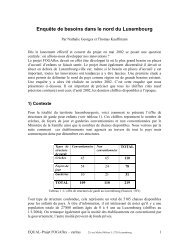Die Entwicklung integrierter familienunterstützender - Qualiflex.lu
Die Entwicklung integrierter familienunterstützender - Qualiflex.lu
Die Entwicklung integrierter familienunterstützender - Qualiflex.lu
Create successful ePaper yourself
Turn your PDF publications into a flip-book with our unique Google optimized e-Paper software.
England – 2. In-depth description of selected programmes and services<br />
mal childcare increased at a higher rate than the use of informal care (7%<br />
and 5%, respectively) (Smith, 2007).<br />
In terms of ethnic groups, black Caribbean families tend to have a relatively<br />
high use of childcare. In contrast, Pakistani and Bangladeshi families<br />
have yet to take up formal childcare in great numbers (Bryson et al, 2006:<br />
table 2.19; Bell et al, 2005; Kazimirski et al, 2006; Hall, Bance & Denton,<br />
2004).<br />
2.3 Which offers are being integrated in which<br />
form?<br />
Services are integrated in a variety of forms. For example, childminder services<br />
are often attached to Children’s Centres rather than being a part of<br />
them. Thus, private and independent services are integrated into the Centres<br />
without being specifically controlled by them. At present, Sure Start programmes<br />
are diverse and varied. They do not necessarily conform to a specific<br />
model, but rather incorporate different elements. Children’s Centres in<br />
the most disadvantaged areas have been created with specific services dictated<br />
by the original basic plan, while in less disadvantaged areas, the local<br />
authorities have more freedom to design and adapt their own Children’s<br />
Centres to their specific needs of local families. Neighbourhood Nurseries<br />
and Early Excellence Centres, in addition to primary schools, community,<br />
and family centres, also provide settings for Children’s Centres. These centres<br />
ideally provide a network that links individual families to specialist services,<br />
inc<strong>lu</strong>ding language training, therapy, and adult education. For example,<br />
Children’s Centres offer programmes for Speech & Language Therapy,<br />
Smoking Cessation, Community Midwifery, and Health Visiting. Extended<br />
Schools are not based on any particular model, but rather describe a set of<br />
services that might be provided by any individual school, such as study support,<br />
childcare, parenting and family support, adult and family learning, and<br />
ICT. Examples of such education programmes on offer inc<strong>lu</strong>de: LearnDirect,<br />
Skills for Life classes, and UK Online. Increasingly, services are being introduced<br />
locally as a response to the newly developing needs of dual-earner<br />
families (household support services, market-based initiatives) (TeacherNet<br />
website—Whole School Issues).<br />
The broad framework in which all Early Years, early education, and<br />
childcare services fall under the Labour government is the Every Child Matters<br />
agenda. The agenda covers health, social development, housing, a safe<br />
environment and education. Within this framework fall programmes such as<br />
Sure Start, Neighbourhood Nurseries, and Extended Schools. These programmes<br />
have shifted in their organisation over the course of the Labour<br />
government: since 1997, there has been a ‘systemic shift in service transformation’<br />
that has not only expanded services but a fundamental change in<br />
the conception of childcare and education as inextricable elements of family<br />
policy (Smith, 2007).<br />
15



